- Home
- Jack London
The House of Pride Page 8
The House of Pride Read online
Page 8
“I wonder what you would do if you saw your friend, your brother, on the slippery lip of a precipice, slipping, slipping, and you were able to do nothing. That was just it. I could do nothing. I saw it coming, and I could do nothing. My God, man, what could I do? There it was, malignant and incontestable, the mark of the thing on his brow. No one else saw it. It was because I loved him so, I do believe, that I alone saw it. I could not credit the testimony of my senses. It was too incredibly horrible. Yet there it was, on his brow, on his ears. I had seen it, the slight puff of the earlobes-oh, so imperceptibly slight. I watched it for months. Then, next, hoping against hope, the darkening of the skin above both eyebrows-oh, so faint, just like the dimmest touch of sunburn. I should have thought it sunburn but that there was a shine to it, such an invisible shine, like a little highlight seen for a moment and gone the next. I tried to believe it was sunburn, only I could not. I knew better. No one noticed it but me. No one ever noticed it except Stephen Kaluna, and I did not know that till afterward. But I saw it coming, the whole damnable, unnamable awfulness of it; but I refused to think about the future. I was afraid. I could not. And of nights I cried over it.
“He was my friend. We fished sharks on Niihau together. We hunted wild cattle on Mauna Kea and Mauna Loa. We broke horses and branded steers on the Carter Ranch. We hunted goats through Haleakala. He taught me diving and surfing until I was nearly as clever as he, and he was cleverer than the average Kanaka. I have seen him dive in fifteen fathoms, and he could stay down two minutes. He was an amphibian and a mountaineer. He could climb wherever a goat dared climb. He was afraid of nothing. He was on the wrecked Luga, and he swam thirty miles in thirty-six hours in a heavy sea. He could fight his way out through breaking combers that would batter you and me to a jelly. He was a great, glorious man-god. We went through the Revolution together. We were both romantic loyalists. He was shot twice and sentenced to death. But he was too great a man for the republicans to kill. He laughed at them. Later, they gave him honour and made him Sheriff of Kona. He was a simple man, a boy that never grew up. His was no intricate brain pattern. He had no twists nor quirks in his mental processes. He went straight to the point, and his points were always simple.
“And he was sanguine. Never have I known so confident a man, nor a man so satisfied and happy. He did not ask anything from life. There was nothing left to be desired. For him life had no arrears. He had been paid in full, cash down, and in advance. What more could he possibly desire than that magnificent body, that iron constitution, that immunity from all ordinary ills, and that lowly wholesomeness of soul? Physically he was perfect. He had never been sick in his life. He did not know what a headache was. When I was so afflicted he used to look at me in wonder, and make me laugh with his clumsy attempts at sympathy. He did not understand such a thing as a headache. He could not understand. Sanguine? No wonder. How could he be otherwise with that tremendous vitality and incredible health?
“Just to show you what faith he had in his glorious star, and, also, what sanction he had for that faith. He was a youngster at the time-I had just met him-when he went into a poker game at Wailuku. There was a big German in it, Schultz his name was, and he played a brutal, domineering game. He had had a run of luck as well, and he was quite insufferable, when Lyte Gregory dropped in and took a hand. The very first hand it was Schultz’s blind. Lyte came in, as well as the others, and Schultz raised them out-all except Lyte. He did not like the German’s tone, and he raised him back. Schultz raised in turn, and in turn Lyte raised Schultz. So they went, back and forth. The stakes were big. And do you know what Lyte held? A pair of kings and three little clubs. It wasn’t poker. Lyte wasn’t playing poker. He was playing his optimism. He didn’t know what Schultz held, but he raised and raised until he made Schultz squeal, and Schultz held three aces all the time. Think of it! A man with a pair of kings compelling three aces to see before the draw!
“Well, Schultz called for two cards. Another German was dealing, Schultz’s friend at that. Lyte knew then that he was up against three of a kind. Now what did he do? What would you have done? Drawn three cards and held up the kings, of course. Not Lyte. He was playing optimism. He threw the kings away, held up the three little clubs, and drew two cards. He never looked at them. He looked across at Schultz to bet, and Schultz did bet, big. Since he himself held three aces he knew he had Lyte, because he played Lyte for threes, and, necessarily, they would have to be smaller threes. Poor Schultz! He was perfectly correct under the premises. His mistake was that he thought Lyte was playing poker. They bet back and forth for five minutes, until Schultz’s certainty began to ooze out. And all the time Lyte had never looked at his two cards, and Schultz knew it. I could see Schultz think, and revive, and splurge with his bets again. But the strain was too much for him.”
“‘Hold on, Gregory,’ he said at last. ‘I’ve got you beaten from the start. I don’t want any of your money. I’ve got-’”
“‘Never mind what you’ve got,’ Lyte interrupted. ‘You don’t know what I’ve got. I guess I’ll take a look.’”
“He looked, and raised the German a hundred dollars. Then they went at it again, back and forth and back and forth, until Schultz weakened and called, and laid down his three aces. Lyte faced his five cards. They were all black. He had drawn two more clubs. Do you know, he just about broke Schultz’s nerve as a poker player. He never played in the same form again. He lacked confidence after that, and was a bit wobbly.”
“‘But how could you do it?’ I asked Lyte afterwards. ‘You knew he had you beaten when he drew two cards. Besides, you never looked at your own draw.’”
“‘I didn’t have to look,’ was Lyte’s answer. ‘I knew they were two clubs all the time. They just had to be two clubs. Do you think I was going to let that big Dutchman beat me? It was impossible that he should beat me. It is not my way to be beaten. I just have to win. Why, I’d have been the most surprised man in this world if they hadn’t been all clubs.’”
“That was Lyte’s way, and maybe it will help you to appreciate his colossal optimism. As he put it he just had to succeed, to fare well, to prosper. And in that same incident, as in ten thousand others, he found his sanction. The thing was that he did succeed, did prosper. That was why he was afraid of nothing. Nothing could ever happen to him. He knew it, because nothing had ever happened to him. That time the Luga was lost and he swam thirty miles, he was in the water two whole nights and a day. And during all that terrible stretch of time he never lost hope once, never once doubted the outcome. He just knew he was going to make the land. He told me so himself, and I know it was the truth.
“Well, that is the kind of a man Lyte Gregory was. He was of a different race from ordinary, ailing mortals. He was a lordly being, untouched by common ills and misfortunes. Whatever he wanted he got. He won his wife-one of the Caruthers, a little beauty-from a dozen rivals. And she settled down and made him the finest wife in the world. He wanted a boy. He got it. He wanted a girl and another boy. He got them. And they were just right, without spot or blemish, with chests like little barrels, and with all the inheritance of his own health and strength.
“And then it happened. The mark of the beast was laid upon him. I watched it for a year. It broke my heart. But he did not know it, nor did anybody else guess it except that cursed hapa-haole, Stephen Kaluna. He knew it, but I did not know that he did. And-yes-Doc Strowbridge knew it. He was the federal physician, and he had developed the leper eye. You see, part of his business was to examine suspects and order them to the receiving station at Honolulu. And Stephen Kaluna had developed the leper eye. The disease ran strong in his family, and four or five of his relatives were already on Molokai.
“The trouble arose over Stephen Kaluna’s sister. When she became suspect, and before Doc Strowbridge could get hold of her, her brother spirited her away to some hiding-place. Lyte was Sheriff of Kona, and it was his business to find her.
“We were all over at Hilo that night, in Ned Aus
tin’s. Stephen Kaluna was there when we came in, by himself, in his cups, and quarrelsome. Lyte was laughing over some joke-that huge, happy laugh of a giant boy. Kaluna spat contemptuously on the floor. Lyte noticed, so did everybody; but he ignored the fellow. Kaluna was looking for trouble. He took it as a personal grudge that Lyte was trying to apprehend his sister. In half a dozen ways he advertised his displeasure at Lyte’s presence, but Lyte ignored him. I imagined Lyte was a bit sorry for him, for the hardest duty of his office was the apprehension of lepers. It is not a nice thing to go in to a man’s house and tear away a father, mother, or child, who has done no wrong, and to send such a one to perpetual banishment on Molokai. Of course, it is necessary as a protection to society, and Lyte, I do believe, would have been the first to apprehend his own father did he become suspect.
“Finally, Kaluna blurted out: ‘Look here, Gregory, you think you’re going to find Kalaniweo, but you’re not.’
“Kalaniweo was his sister. Lyte glanced at him when his name was called, but he made no answer. Kaluna was furious. He was working himself up all the time.
“‘I’ll tell you one thing,’ he shouted. ‘You’ll be on Molokai yourself before ever you get Kalaniweo there. I’ll tell you what you are. You’ve no right to be in the company of honest men. You’ve made a terrible fuss talking about your duty, haven’t you? You’ve sent many lepers to Molokai, and knowing all the time you belonged there yourself.’
“I’d seen Lyte angry more than once, but never quite so angry as at that moment. Leprosy with us, you know, is not a thing to jest about. He made one leap across the floor, dragging Kaluna out of his chair with a clutch on his neck. He shook him back and forth savagely, till you could hear the half-caste’s teeth rattling.
“‘What do you mean?’ Lyte was demanding. ‘Spit it out, man, or I’ll choke it out of you!’
“You know, in the West there is a certain phrase that a man must smile while uttering. So with us of the islands, only our phrase is related to leprosy. No matter what Kaluna was, he was no coward. As soon as Lyte eased the grip on his throat he answered:-
“‘I’ll tell you what I mean. You are a leper yourself.’
“Lyte suddenly flung the half-caste sideways into a chair, letting him down easily enough. Then Lyte broke out into honest, hearty laughter. But he laughed alone, and when he discovered it he looked around at our faces. I had reached his side and was trying to get him to come away, but he took no notice of me. He was gazing, fascinated, at Kaluna, who was brushing at his own throat in a flurried, nervous way, as if to brush off the contamination of the fingers that had clutched him. The action was unreasoned, genuine.
“Lyte looked around at us, slowly passing from face to face.
“‘My God, fellows! My God!’ he said.
“He did not speak it. It was more a hoarse whisper of fright and horror. It was fear that fluttered in his throat, and I don’t think that ever in his life before he had known fear.
“Then his colossal optimism asserted itself, and he laughed again.
“‘A good joke-whoever put it up,’ he said. ‘The drinks are on me. I had a scare for a moment. But, fellows, don’t do it again, to anybody. It’s too serious. I tell you I died a thousand deaths in that moment. I thought of my wife and the kids, and… ’
“His voice broke, and the half-caste, still throat-brushing, drew his eyes. He was puzzled and worried.
“‘John,’ he said, turning toward me.
“His jovial, rotund voice rang in my ears. But I could not answer. I was swallowing hard at that moment, and besides, I knew my face didn’t look just right.
“‘John,’ he called again, taking a step nearer.
“He called timidly, and of all nightmares of horrors the most frightful was to hear timidity in Lyte Gregory’s voice.
“‘John, John, what does it mean?’ he went on, still more timidly. ‘It’s a joke, isn’t it? John, here’s my hand. If I were a leper would I offer you my hand? Am I a leper, John?’
“He held out his hand, and what in high heaven or hell did I care? He was my friend. I took his hand, though it cut me to the heart to see the way his face brightened.
“‘It was only a joke, Lyte,’ I said. ‘We fixed it up on you. But you’re right. It’s too serious. We won’t do it again.’
“He did not laugh this time. He smiled, as a man awakened from a bad dream and still oppressed by the substance of the dream.
“‘All right, then,’ he said. ‘Don’t do it again, and I’ll stand for the drinks. But I may as well confess that you fellows had me going south for a moment. Look at the way I’ve been sweating.’
“He sighed and wiped the sweat from his forehead as he started to step toward the bar.
“‘It is no joke,’ Kaluna said abruptly. I looked murder at him, and I felt murder, too. But I dared not speak or strike. That would have precipitated the catastrophe which I somehow had a mad hope of still averting.
“‘It is no joke,’ Kaluna repeated. ‘You are a leper, Lyte Gregory, and you’ve no right putting your hands on honest men’s flesh-on the clean flesh of honest men.’
“Then Gregory flared up.
“‘The joke has gone far enough! Quit it! Quit it, I say, Kaluna, or I’ll give you a beating!’
“‘You undergo a bacteriological examination,’ Kaluna answered, ‘and then you can beat me-to death, if you want to. Why, man, look at yourself there in the glass. You can see it. Anybody can see it. You’re developing the lion face. See where the skin is darkened there over your eyes.
“Lyte peered and peered, and I saw his hands trembling.
“‘I can see nothing,’ he said finally, then turned on the hapa-haole. ‘You have a black heart, Kaluna. And I am not ashamed to say that you have given me a scare that no man has a right to give another. I take you at your word. I am going to settle this thing now. I am going straight to Doc Strowbridge. And when I come back, watch out.’
“He never looked at us, but started for the door.
“‘You wait here, John,’ he said, waving me back from accompanying him.
“We stood around like a group of ghosts.
“‘It is the truth,’ Kaluna said. ‘You could see it for yourselves.’
“They looked at me, and I nodded. Harry Burnley lifted his glass to his lips, but lowered it untasted. He spilled half of it over the bar. His lips were trembling like a child that is about to cry. Ned Austin made a clatter in the ice-chest. He wasn’t looking for anything. I don’t think he knew what he was doing. Nobody spoke. Harry Burnley’s lips were trembling harder than ever. Suddenly, with a most horrible, malignant expression he drove his fist into Kaluna’s face. He followed it up. We made no attempt to separate them. We didn’t care if he killed the half-caste. It was a terrible beating. We weren’t interested. I don’t even remember when Burnley ceased and let the poor devil crawl away. We were all too dazed.
“Doc Strowbridge told me about it afterward. He was working late over a report when Lyte came into his office. Lyte had already recovered his optimism, and came swinging in, a trifle angry with Kaluna to be sure, but very certain of himself. ‘What could I do?’ Doc asked me. ‘I knew he had it. I had seen it coming on for months. I couldn’t answer him. I couldn’t say yes. I don’t mind telling you I broke down and cried. He pleaded for the bacteriological test. ‘Snip out a piece, Doc,’ he said, over and over. ‘Snip out a piece of skin and make the test.’”
“The way Doc Strowbridge cried must have convinced Lyte. The Claudine was leaving next morning for Honolulu. We caught him when he was going aboard. You see, he was headed for Honolulu to give himself up to the Board of Health. We could do nothing with him. He had sent too many to Molokai to hang back himself. We argued for Japan. But he wouldn’t hear of it. ‘I’ve got to take my medicine, fellows,’ was all he would say, and he said it over and over. He was obsessed with the idea.
“He wound up all his affairs from the Receiving Station at Honolulu, and went down t
o Molokai. He didn’t get on well there. The resident physician wrote us that he was a shadow of his old self. You see he was grieving about his wife and the kids. He knew we were taking care of them, but it hurt him just the same. After six months or so I went down to Molokai. I sat on one side a plate-glass window, and he on the other. We looked at each other through the glass and talked through what might be called a speaking tube. But it was hopeless. He had made up his mind to remain. Four mortal hours I argued. I was exhausted at the end. My steamer was whistling for me, too.
“But we couldn’t stand for it. Three months later we chartered the schooner Halcyon. She was an opium smuggler, and she sailed like a witch. Her master was a squarehead who would do anything for money, and we made a charter to China worth his while. He sailed from San Francisco, and a few days later we took out Landhouse’s sloop for a cruise. She was only a five-ton yacht, but we slammed her fifty miles to windward into the north-east trade. Seasick? I never suffered so in my life. Out of sight of land we picked up the Halcyon, and Burnley and I went aboard.
“We ran down to Molokai, arriving about eleven at night. The schooner hove to and we landed through the surf in a whale-boat at Kalawao-the place, you know, where Father Damien died. That squarehead was game. With a couple of revolvers strapped on him he came right along. The three of us crossed the peninsula to Kalaupapa, something like two miles. Just imagine hunting in the dead of night for a man in a settlement of over a thousand lepers. You see, if the alarm was given, it was all off with us. It was strange ground, and pitch dark. The leper’s dogs came out and bayed at us, and we stumbled around till we got lost.

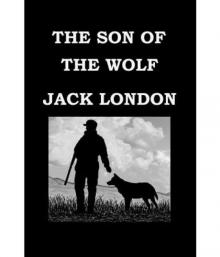 The Son of the Wolf
The Son of the Wolf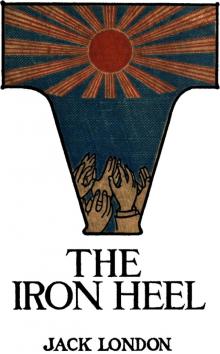 The Iron Heel
The Iron Heel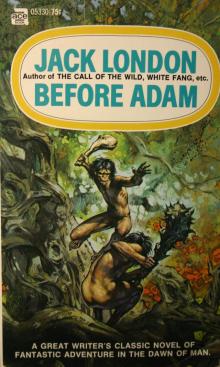 Before Adam
Before Adam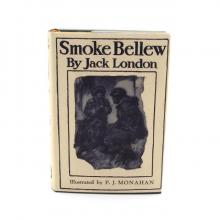 Smoke Bellew
Smoke Bellew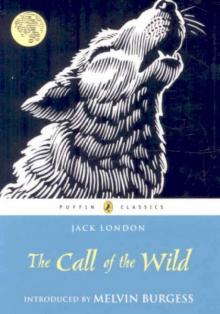 The Call of the Wild
The Call of the Wild The Valley of the Moon Jack London
The Valley of the Moon Jack London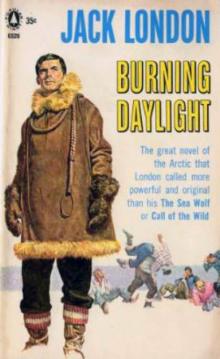 Burning Daylight
Burning Daylight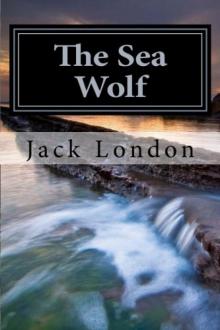 The Sea Wolf
The Sea Wolf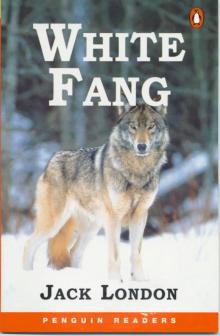 White Fang
White Fang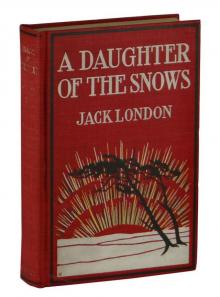 A Daughter of the Snows
A Daughter of the Snows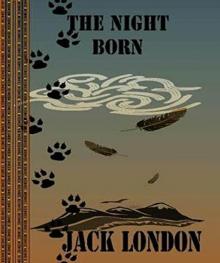 The Night-Born
The Night-Born A Son Of The Sun
A Son Of The Sun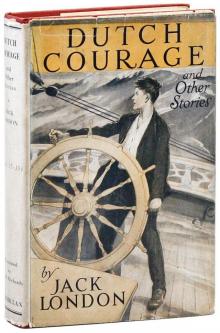 Dutch Courage and Other Stories
Dutch Courage and Other Stories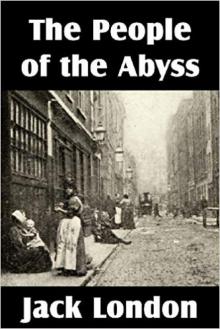 The People of the Abyss
The People of the Abyss Michael, Brother of Jerry
Michael, Brother of Jerry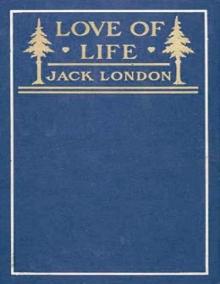 Love of Life, and Other Stories
Love of Life, and Other Stories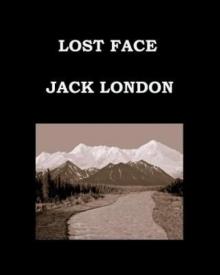 Lost Face
Lost Face The Road
The Road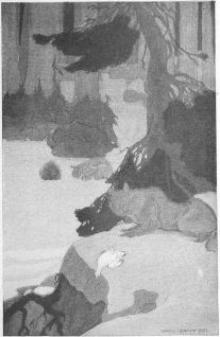 Love of Life
Love of Life The Turtles of Tasman
The Turtles of Tasman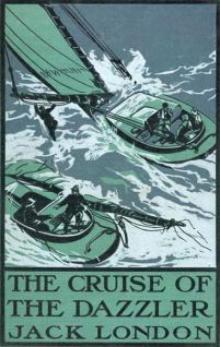 The Cruise of The Dazzler
The Cruise of The Dazzler The Heathen
The Heathen The Scab
The Scab The Faith of Men
The Faith of Men Adventure
Adventure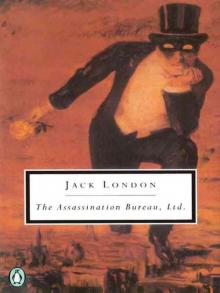 The Assassination Bureau, Ltd.
The Assassination Bureau, Ltd.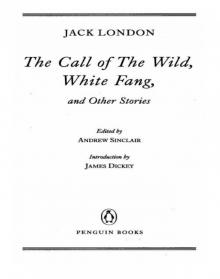 The Call of the Wild, White Fang, and Other Stories
The Call of the Wild, White Fang, and Other Stories The Call of the Wild and Selected Stories
The Call of the Wild and Selected Stories Jerry of the Islands
Jerry of the Islands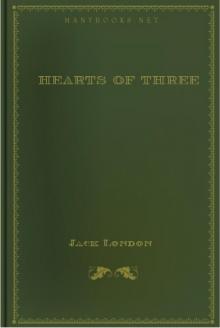 Hearts of Three
Hearts of Three The House of Pride
The House of Pride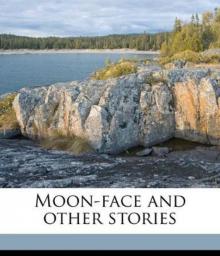 Moon-Face and Other Stories
Moon-Face and Other Stories Children of the Frost
Children of the Frost South Sea Tales
South Sea Tales The Strength of the Strong
The Strength of the Strong The Jacket (The Star-Rover)
The Jacket (The Star-Rover) The Little Lady of the Big House
The Little Lady of the Big House John Barleycorn
John Barleycorn ADaugter of Snows
ADaugter of Snows The Mutiny of the Elsinore
The Mutiny of the Elsinore Northland Stories
Northland Stories Tales of the Fish Patrol
Tales of the Fish Patrol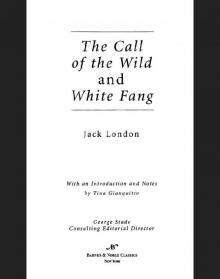 Call of the Wild and White Fang (Barnes & Noble Classics Series)
Call of the Wild and White Fang (Barnes & Noble Classics Series) The Valley of the Moon
The Valley of the Moon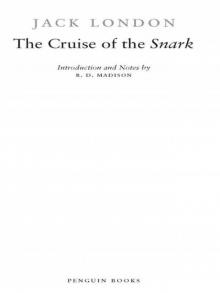 The Cruise of the Snark
The Cruise of the Snark The Game
The Game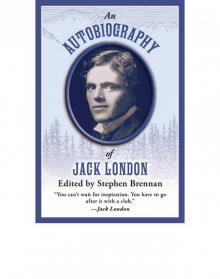 An Autobiography of Jack London
An Autobiography of Jack London